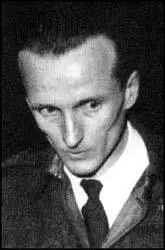René Hardy

René Hardy was born in France in 1911. He worked as an official on the French national railroads and during the Second World War he joined the French Resistance group Combat and carried out several acts of sabotage against the Germans.
On 7th June 1943, Hardy was arrested by the Gestapo. His chief interrogator, Klaus Barbie, eventually obtained enough information to arrest Jean Moulin, Pierre Brossolette and Charles Delestraint. Moulin and Brossolette both died while being tortured and Delestraint was sent to Dachau where he was killed near the end of the war.
As Allied troops approached Lyons in September 1944, Barbie destroyed Gestapo records and killed hundreds of Frenchmen who had first-hand knowledge of his brutal interrogation methods. This included twenty double-agents who had been supplying his with information about the French Resistance.
Barbie fled back to Nazi Germany where he was recruited by the US Counter-Intelligence Corps (CIC). Barbie impressed his American handlers by infiltrating the Bavarian branch of the Communist Party. According to the CIC Barbie's "value as an informant infinitely outweighs any use he may have in prison."
In 1947 Hardy was charged with working with the German authorities in Lyons. He was found not guilty but was retried in 1950. Both the prosecution and the defence teams wanted Klaus Barbie to testify. At this time John J. McCloy, the High Commissioner for Germany, was concerned about the growth of communism in Bavaria and valued the role played by Barbie in this struggle. Therefore he decided to reject the requests being made by the French authorities to hand over Barbie. During the trial, Hardy's defence lawyer exposed what was happening by announcing in court that it was "scandalous that the U.S. military authorities in Germany were protecting Barbie from extradition for security reasons."
Barbie was in fact in hiding in a CIC safe house in the American Zone in Germany. McCloy denied any knowledge of where Barbie was and instead announced that the case was under investigation. McCloy was informed by CIC that: "This entire Hardy-Barbie affair is being pushed as a political issue by left-wing elements in France. No strong effort has been made by the French to obtain Barbie because of the political embarrassment his testimony might cause certain high French officials." In other words, Barbie had information that would show how prominent French politicians who during the war had collaborated with the Gestapo. The American government also were worried about what Barbie might say about his involvement with the CIC in Germany.
On 8th May, 1950, Hardy was acquitted and afterwards became a successful novelist. As Kai Bird pointed out (The Chairman: John J. McCloy: The Making of the American Establishment): "The enraged French public blamed the Americans for not allowing Barbie, the star witness against Hardy, to be extradited from Germany. By the end of May, under pressure from French resistance veterans, the French government had once again requested Barbie's apprehension."
John J. McCloy was now in a difficult position. He was reluctant to admit that the CIC was employing an accused war criminal. In fact, it was more serious than that. According to one CIC document, Klaus Barbie had "personally directed CIC's counterintelligence operations aimed at infiltrating French intelligence." CIC told McCloy that "a complete disclosure by Barbie to the French of his activities on behalf of CIC would... furnish the French with evidence that we had been directing intelligence operations against them."
Throughout the summer and autumn of 1950 McCloy told the French that "continuous efforts to locate Barbie are being made". In reality, no search of any kind was conducted as they knew where he was living. In fact, he continued to draw a CIC salary during this period. In March, 1951, Barbie was smuggled out of Germany and given a new life in Bolivia. In 1957 he acquired Bolivian citizenship under the pseudonym Klaus Altmann
It was not until 1983 that Nazi hunters were able to find Klaus Barbie and have him extradited to France. At his trial in 1987, Barbie claimed that Hardy had worked for him as a double agent. René Hardy died later that year without new charges being brought against him.
